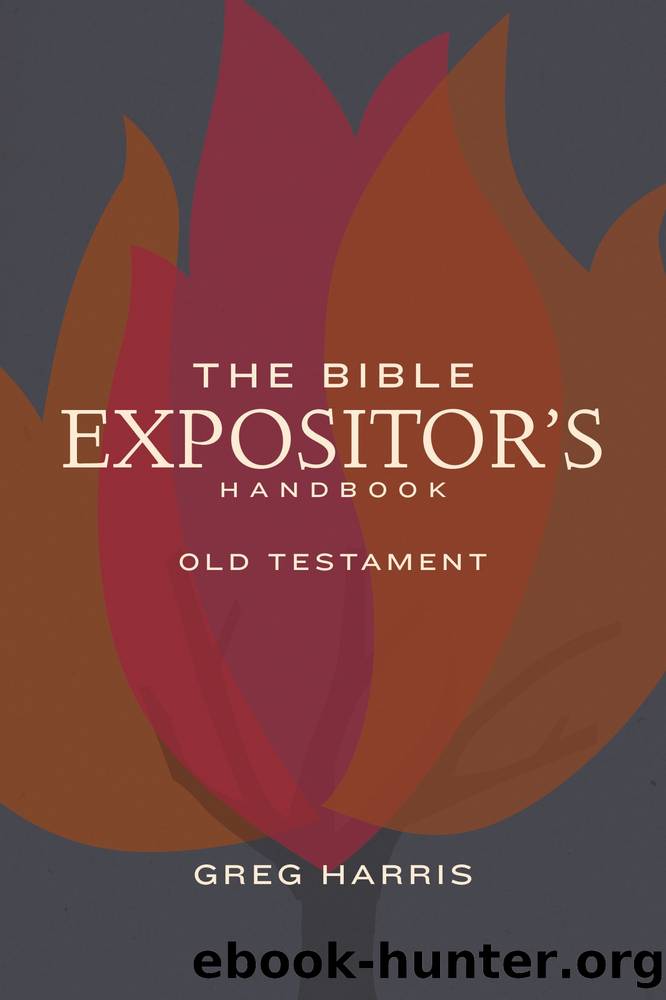The Bible Expositor's Handbook by Greg Harris

Author:Greg Harris [Harris, Dr. Greg]
Language: eng
Format: epub
Publisher: B&H Publishing Group
Published: 2016-01-15T00:00:00+00:00
Considering Joshua 13:1-7, which deals with particulars related to the land of Canaan, with the added reference in Joshua 1:4 to the territory associated with the Euphrates that lies outside of the then-occupied land, it is beyond argument that Israel never possessed the land as stipulated in the Abrahamic covenant during the days of Joshua. Israel's failure to occupy all the land that God promised is a significant point observed by both nondispensational and dispensational camps. Regarding the land promises given to Israel, several amillennial scholars acknowledge the clear teaching that the Israelites never came into undisputed possession of the whole Promised Land, to the full extent of the boundaries God had given.
Finally, regarding a proposed interpretation of Joshua 21:43-45, at first glance Joshua 21:45 does seem to be all encompassing: "Not one of the good promises which the Lord had made to the house of Israel failed; all came to pass." But as has been shown, these verses do not sit isolated, away from the previous revelation from God. Those who cite Joshua 21:43-45 as having fulfilled God's land promises of the Abrahamic covenant are, admittedly, not completely taking verses out of context, because Joshua 21 does indeed refer to portions of the land promised to Israel by God. Nevertheless, such an interpretation of Joshua 21:43-45 is built upon a reading of the text in isolation and exclusion from previous revelation given by God regarding the specific land boundaries, eschatological promises from the Pentateuch, and even passages within the book of Joshua, namely Joshua 1:1â4 and 13:1-7. Simply put, those who cite Joshua 21:43-45 as indication that God had fulfilled all of His land promises to Israel disregard some very significant problem passages for this position.
It is no wonder that John Calvin and many others avoided the claim that all of God's land promises had been fulfilled by God by the time of Joshua 21:43-45; this interpretation is inherently weak and laden with massiveâand ultimately unexplainableâ theological problems for those who accept the Bible as God's divine revelation, if for no other reason than how God Himself appraised the land situation in Joshua 13:1-7.
It is better to understand Joshua 21:43-45 in a much more restricted manner: Yahweh had indeed fulfilled all His good promises up to that time, but Joshua 21:43-45 is just a historical marker in God's faithfulness and not the pinnacle or completion of His covenant faithfulness. Such an understanding is found elsewhere in Scripture. For instance, Paul's benediction in Romans 16:25-27 makes a far-reaching statement regarding how far the gospel had gone forth by the time Paul authored the epistle:
Now to Him who is able to establish you according to my gospel and the preaching of Jesus Christ, according to the revelation of the mystery which has been kept secret for long ages past, but now is manifested, and by the Scriptures of the prophets, according to the commandment of the eternal God, has been made known to all the nations, leading to obedience of faith; to the only wise God, through Jesus Christ, be the glory forever.
Download
This site does not store any files on its server. We only index and link to content provided by other sites. Please contact the content providers to delete copyright contents if any and email us, we'll remove relevant links or contents immediately.
Joan of Arc by Mary Gordon(4076)
Victory over the Darkness by Neil T. Anderson(2847)
The Gnostic Gospels by Pagels Elaine(2515)
Devil, The by Almond Philip C(2318)
The Nativity by Geza Vermes(2217)
The Psychedelic Gospels: The Secret History of Hallucinogens in Christianity by Jerry B. Brown(2145)
Going Clear: Scientology, Hollywood, and the Prison of Belief by Lawrence Wright(1970)
Going Clear by Lawrence Wright(1953)
A TIME TO KEEP SILENCE by Patrick Leigh Fermor(1888)
Barking to the Choir by Gregory Boyle(1811)
Old Testament History by John H. Sailhamer(1795)
Augustine: Conversions to Confessions by Robin Lane Fox(1762)
A Prophet with Honor by William C. Martin(1710)
A History of the Franks by Gregory of Tours(1709)
The Bible Doesn't Say That by Dr. Joel M. Hoffman(1673)
The Knights Templar by Sean Martin(1645)
by Christianity & Islam(1622)
The Source by James A. Michener(1590)
The Amish by Steven M. Nolt(1553)
